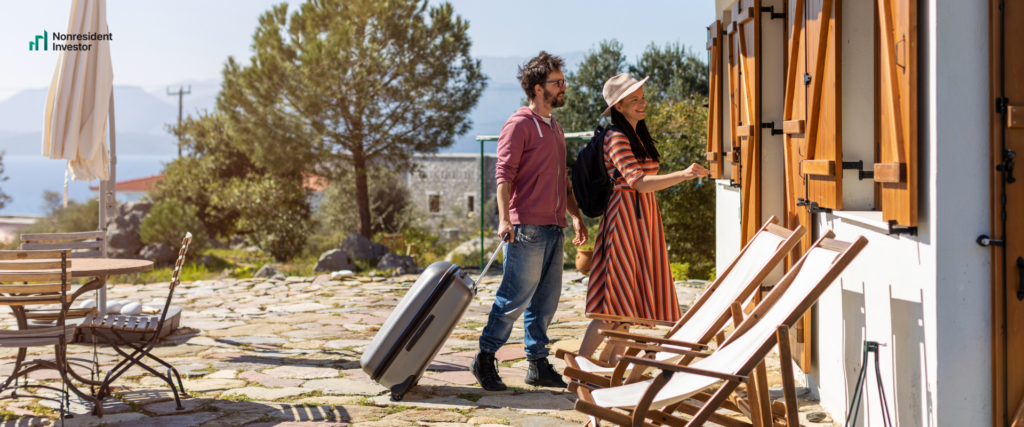Investing in short term rentals in the US has been particularly hot over the last few years. The changes in tourist preferences and travel habits are the primary reasons more and more people are opting to stay in these time-sharing properties over traditional hotels. And thanks to the rising prices in the real estate market, many local and foreign real estate investors have been interested to invest in short term rentals.
In 2022, more than 1,2 million short term rental listings were posted in the US. And many of them weren’t even listed by investors. Even regular folk invest in short term rentals since that business model is one of the easiest ways to earn extra cash from their rarely used vacation homes or that vacant bedroom.
But whether you’re an investor looking to build a short term rental business or just want to rent one of your rooms or properties for some passive income, you must first learn the ropes of creating and managing short term rentals.
This guide will teach you everything you need to know about renting out your property as a short term rental. Some of the things we’ll cover are the regulations behind short term rentals, how to choose the right location for one, how to find guests easily, and much more.
Let’s start from the basics…
What Is a Short Term Rental Property?
A short term rental property is a residential unit or building that individuals or investors rent out for shorter periods (usually under 30 days). However, this number may vary between local jurisdictions.
Short-term rental properties are also known as vacation rentals, transient rentals, or resort dwelling units.
There are three primary types of short term rentals:
- Entire homes — The owner rents out the whole property to a third party for a limited time while they are away.
- Accessory dwellings — The owner rents out a part of the property where they live temporarily.
- Rooms — The owner rents out one or more rooms of a property while sharing the rest of the living quarters (e.g., living room, bathroom) with other tenants or themselves (if they live there).
- An Apartment in an Apartment Complex — The owner of the apartment complex (usually a large investor) rents out one or several apartments temporarily on a short term rental model.
Despite being an excellent source of additional income for individuals or a lucrative business for real estate investors, the biggest challenge of getting into the short term rental industry is local regulations.

How Are Short Term Rental Properties Regulated?
Short term rental properties are regulated on a local level. That means every state (and even county) may have different rules on how to invest in short term rentals.
This lack of unified regulation may prove troublesome for nonresident investors, as it will require a lot of research to ensure your property complies with all the requirements. These regulations are so strict and diverse to protect the interests and safety of owners, visitors, and neighbors.
Here are some of the most common things local authorities regulate about short term rental properties that you’ll need to check before renting:
- Required Business Permits and Licenses — Most places need you to get a license to operate and invest in short term rentals, like any other business. That allows the government to collect tax revenue from short term rentals within their jurisdiction.
- The Maximum Number of Short Term Rental Properties Owned — Some states and municipalities with housing shortages may limit the number of short term rentals you may own. They do that to allow local neighborhoods to form long-lasting communities and prevent them from getting overrun by foreign visitors.
- Local Building and Housing Standards — Like all businesses, short term rentals must adhere to specific health, safety, and sanitation rules. These regulations exist to ensure tenants enjoy suitable living conditions.
- Party Rules and Regulations — Most communities and neighborhoods have strict no-party policies. As a landlord, you must communicate these rules with your tenants and enforce them.
- Neighborhood-Specific Policies — Depending on the type of neighborhood your short term rental is located in, there may also be community-specific policies you’ll need to adhere to. For instance, affluent communities have stricter noise and trash rules than urban or working-class neighborhoods. Always double-check these before renting your property.
The Advantages When You Invest in Short Term Rentals
Despite the many regulatory hurdles to turning your property into a short term rental, many benefits make it well worthwhile.
- You Can Earn More at the Right Locations — Short term rentals are more profitable than regular real estate if you choose your location carefully. Having a property near a tourist hot spot or in a highly sought-after neighborhood will allow you to charge premium prices.
- Finding Tenants and Doing Marketing for Short Term Rentals Is Mostly Automated — Thanks to platforms like Airbnb and Booking.com, you will need minimal investment and marketing when you invest in short term rentals. If you were to look for long-term tenants instead, you’d need to invest much more time and money to find reliable ones.
- Short Term Rentals Give You a Lot of Flexibility — The best part when you invest in short term rentals is that you don’t need to rent them out throughout the year. Instead, you can use them yourself to go on a holiday or relax away from home whenever you want to.
- You Can Earn Money on the Side With a Short Term Rental Business — Even if you aren’t getting into the business full-time, you can still use this model to earn some extra cash. When you invest short term rentals, you don’t have to rent an entire property — a single room can suffice.
As you can see, the best part about short term rentals is that they have a low barrier to entry. That makes them suitable for investors and people just looking for an additional income stream. However, getting into the short term rental industry also has a few downsides.

The Downsides When You Invest in Short Term Rentals
Compared to traditional real estate investing, having short term rentals comes with a few challenges, though:
- Short Term Rentals Are Harder to Manage — Due to frequent vacancies and lots of legal regulations around short-term rentals, you’ll need to actively manage them regularly. At the same time, you’ll need to communicate with potential tenants much more often, which can be particularly difficult for nonresident investors.
- High Maintenance Costs — Short term rentals come with additional costs that regular real estate rentals don’t have. Some of the most notable ones are frequent cleaning fees, a higher risk of property damage, and expenses related to furnishings.
- Higher Vacancy Rates — Short term rentals can be incredibly profitable but have higher vacancy rates. That means your income may vary significantly from season to season (or period), making them less reliable for investors who value stability.
- Customer Satisfaction Plays a Crucial Role — Like most service-based businesses, the performance of your short term rentals will depend on customer satisfaction greatly (much more than with regular real estate rentals). That means you’ll need to go above and beyond to ensure your customers are satisfied and leave positive reviews if you want to maximize profit.
Despite these hurdles, there are many ways investors and individuals can minimize the impact of these factors and streamline the entire process. For instance, you can hire a property management agency to help you manage your short term rental properties, which is particularly useful for foreigners. So as long as your rental unit is suitable for this business model, there’s no reason not to pursue it.
Speaking of which, here’s how to determine if your property is suitable for short-term renting…
What Makes a Property Suitable for Short Term Renting?
People looking for short term rentals have different needs than those who want to find a permanent residence, so not all properties may be a good fit for the short term rental model. On top of that, having a place to rent in a popular tourist destination can give you an edge. In fact, some cities perform much better than others for short term rentals. If your home or apartment is in one of the best places for Airbnb rentals in the US, you’re in luck.
Still, owning property in a popular city is just part of the equation. Here are a few other things that make a property suitable to rent as a short term rental:
- If It’s Near the City Center or Popular Tourist Destinations — Most people who want a short term rental get one for their vacations or business trips. That is why having it close to the city center or popular tourist or business destinations (e.g., the beach, museums, sports venues) will make renting much easier.
- It Should Be Well-Connected With the Rest of the City — Even if your property isn’t near the city’s hottest locations, having it close to a metro station or simply being well-connected with the rest of the city can compensate for that.
- Your Property Must Be Well-Furnished — People looking for a short term rental accommodation will want to have everything they need for everyday life. That includes a functioning and well-supplied kitchen, tidy bathroom, comfortable beds, seating flexibility, and a plethora of clean towels, at the very least. If your property isn’t furnished or lacks some items, you must provide them before renting.
- The More Amenities You Offer, the Better — When people look for short term rentals, they want to stay as close to their everyday lives as possible. That’s why offering extra amenities like free Wi-Fi, a parking space, AC, and similar will make your property more appealing.
Besides the above, many municipalities have strictly defined rules that a property needs to meet to become a short term rental. However, these guidelines vary from city to city, so you should always consult with local investors or real estate specialists to ensure you do business according to the law.
Once you’ve made sure your property is a good fit to become a short term rental, it’s time to handle all the preparations for renting.

How to Prepare Your Property for Renting (A Checklist)
Before listing your property up for rent as an STR, here are a few things you need to check to ensure you’re ready for guests:
- Make Sure Your Property Is Well-Furnished — Do a last-minute check-up if you have all the furniture your guests need. Is the bed comfortable? Do you have a good size dining table? Are all the chairs accounted for? Are all kitchen appliances working properly? If so, your property is ready to go.
- Ensure the Bathroom Furniture and Appliances Are in Good Condition — Guests must have access to fully functioning hygiene essentials. So always double-check if your shower, bathtub, sink, and other bathroom utensils are in working condition before renting.
- Don’t Forget to Stock Up on Clean Towels — Carrying towels when traveling is impractical, so your guests will need a clean set of towels when they arrive. And don’t forget to leave spare ones as well.
- Check If You Have Enough Dishes for All Your Guests — Having enough dishes to meet the capacity of your STR is essential. So always check if you have enough plates, cutlery, cups, and similar for all your guests. You should do this check-up regularly since accidents happen, and it’s common for guests to break some dishes occasionally.
- Make Sure Your Property Is Cleaned Properly — Hygiene is essential, especially in STRs with many guests. Always organize professional cleaning to ensure your property meets all the necessary health and safety standards before new guests arrive.
- Install a Smart Lock If You Can — Having a smart lock can streamline the check-in and check-out processes. Besides that, it’s also more reliable and safer than a regular lock.
- Ensure Your Property Is Equipped With Adequate Fire Safety Measures — Like most businesses, short term rentals are required to adhere to local fire safety measures. These usually include having a clearly labeled fire-escape route, a fire extinguisher at hand, and a fire alarm installed. On top of that, you must also have a well-equipped first-aid kit somewhere in the place.
Once everything is ready, it’s time to rent your property!
How to Rent Short Term Rental Properties
Nowadays, renting a short term rental is much easier than renting a regular home. And that’s all thanks to the various listing websites like Airbnb, Booking, and Vrbo. All you need to do is create and populate an account and post your listing. The best part is that these platforms will do the heavy lifting for you, and you won’t need to conduct any additional marketing.
Here is what you should keep in mind when creating and optimizing your profile on these websites:
- High-Quality Pictures Are Essential — Pictures are your selling point. They are the first and most important thing potential customers will look at. That’s why you should include as many of them as possible, ensure they are high-quality, and emphasize the ones that capture your STR’s best selling points.
- Decide If You’ll Have a Minimum Stay Length — Depending on your business model and desired ROI, you may want to include a minimal stay length to minimize expenses from mandatory cleaning and the hassle of managing check-ins and check-outs too often. Most STRs usually require a minimum of 3 days of stay, but this number is entirely arbitrary.
- List as Many Amenities as Possible — Customers may land on your listing because of your pictures, but they will buy because of amenities. Things like Wi-Fi, parking, AC, and similar are not optional anymore — they are expected. So make sure you deliver.
- Set the Right Price — Depending on your property’s location, you will need to set a competitive price. No matter how well-furnished your STR is, if it’s not near the city center, you simply cannot charge as much for it as those that are. So always research the competition to find the most adequate pricing for your property.
- Gather and Showcase Customer Reviews — The short term rental business model is highly dependent on customer satisfaction, and most potential guests will look for previous customers’ experiences to decide whether to pick you or your competitors. That’s why you should be diligent at collecting reviews from happy customers and always go above and beyond to make their stay comfortable.

How to Manage Short Term Rental Properties Effectively
If you’re renting out your vacation home or one of your rooms as a short term rental, it’s best you handle property management yourself. You will either be on-site or have direct contact with your guests, so managing a single property won’t prove too difficult.
But when you’re an investor, you probably have more than one STR in your portfolio (or at least that’s your goal). In that case, leaving property management to a professional is much better. Hiring a professional property manager or agency frees up the time you’d have to spend managing your listings, guests, and rent collection. And as a seasoned investor, you should spend that time doing something you do best — looking for more real estate deals.
Just be careful — picking the right property management partner will be crucial to success. Working with a subpar property manager or agency can cost you a lot of precious ROI. Nonresident Investor’s CEO, Luka Malkovich, made the mistake of mismanaging property management when he was starting as a foreign investor, and it set him back months in terms of revenue.
That’s why Luka shared his knowledge and experience in our comprehensive guide on property management to help you avoid his mistakes. You can read our complete guide below.
[Read Property Management Guide]
Short Term Rental Property Management Checklist
Still, if you want to start off managing your STRs yourself or can handle it easily because you don’t have a considerable portfolio yet, here’s a short term rental property management checklist to ensure everything goes as smoothly as possible:
1. Streamline the Check-In and Check-Out Processes
The biggest time sinks when renting out STRs are check-ins and check-outs. And you will have a lot of them. That’s why going with the flow will give you unnecessary headaches and waste much of your time.
Instead, create a system, and stick to it. Here are a few examples that could help you streamline the process as much as possible:
- Communicate with your guests weeks in advance to set the ground rules;
- Install an automatic lock and leave your keys in a key lockbox (eliminating the need to be present when they arrive);
- Compile all the information they need in a single document, preferably on a single sheet of paper (e.g., Wi-Fi password, house rules, any additional instructions);
- Check in on them occasionally to see if they need anything.
You can use a similar principle for checking out. All it comes down to is clear and proper communication with your guests. If you master that and stick to a strictly-defined system, you’ll need minimal engagement on your end.

2. Equip Your Short Term Rental With All the Necessities
Before renting your property and after each guest leaves, you’ll need to equip the unit with all the necessities and make sure they are working properly. These include but are not limited to things like:
- Clean towels,
- Hair drier,
- Plates and cutlery,
- Soap,
- AC,
- Washing machine,
- Clothes iron,
- And similar.
These are just some of the essentials guests will expect when they arrive at a short term rental, and you’ll need to restock some of them regularly.
3. Organize Deep Cleaning In-Between Guest Visits
Maintaining proper hygiene is one of the most important parts of an STR business, but it’s also one of the most challenging. Unless you hire a professional to take care of this aspect, you’ll need to roll up your sleeves several times a month — and we’re sure you don’t have time for that.
So despite being an extra expense, hiring professional cleaners to take care of property hygiene in-between guests pays off. Just make sure to give them enough time (ideally a day or two) to finish everything before new guests arrive.
4. Ensure You Have No Double Bookings Across All of Your Listing Platforms
A common mistake newcomers to the short term rental business make is getting multiple overlapping bookings accidentally. This error tends to happen if you have listings on multiple platforms (which you should). Even though doing this gives you higher reach, these platforms aren’t interconnected, so multiple people can book the same time slot across all of them.
That’s why it’s essential to closely monitor your listings and keep them up to date so that doesn’t happen.
5. Make Your Guests Sign a House Rules Agreement
Whether you’re building a short term rental business or renting a property for some additional income, you should go out of your way to protect yourself. Even though most booking platforms like Airbnb offer some level of protection for property owners, you can never be too safe. And the easiest way to introduce another layer of protection is with a contract.
By having your guests sign a house rules agreement, you ensure yourself and your property by making them legally liable for any damage or breach of contract. No matter how reliable your guests seem, you can never be too safe. After all, a single problematic guest can cost you thousands of dollars or even your operating license.
6. Collect Feedback From Guests and Act Upon It
Last but not least, your entire business depends on customer satisfaction. That’s why collecting feedback on ways to improve your service is vital, and there’s no better way to do it than by asking your customers directly. And if they’re happy with your service, you should also ask them to leave you a positive review on your listing platforms. Most of the time, they’ll be more than happy to do it. These reviews will prove essential in attracting more guests and improving your listing’s visibility.
But how do you get the ball rolling at first when you have no reviews?
If you’re just starting, you should probably consider lowering your prices for the first several customers until you can collect some positive feedback. Being cheaper than your competitors is an excellent way to attract customers and get your business on its feet.

